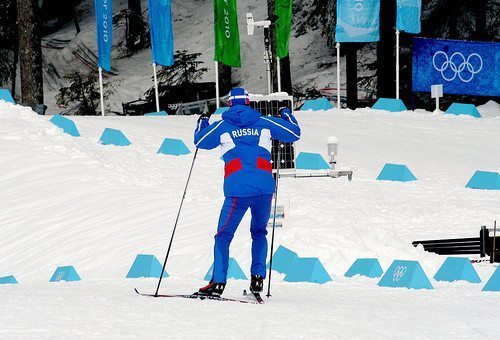Sochi Winter Games are on thin ice
In the lead up to an Olympic Games, the sense of anticipation usually surrounds the athletes, and their chances of winning the most coveted of sporting prizes: an Olympic gold medal.
It is a shame, then, that with this year’s Winter Olympics in Sochi just around the corner, most of the press is focussing on issues away from the slopes and ice-rinks.
Instead of concentrating on the sport, an uncomfortable amount of attention is being turned to the apparent danger that athletes and spectators alike may be in.
The Russian government, including president Vladimir Putin, passed ‘anti-propaganda’ laws in June, an act which has resulted in questions over the safety of gay and lesbian people in the country.
Team GB are travelling with arguably their strongest team in the history of the Winter Olympics
The law officially bans the “propaganda of non-traditional sexual relations to minors”, but has been used as motivation for a host of anti-gay attacks, and the placing of limitations on homosexual rights.
Whilst there is little chance of any athletes being directly affected by the new laws, the safety and freedom of gay spectators, travelling from all over the globe to experience this massive sporting contest, is under serious scrutiny.
The ambiguous nature of the term ‘propaganda’ makes it very hard to interpret, but foreign citizens could be liable to receive fines, 15-day prison sentences, or even face deportation if they are in breach of the law.
Even more recently, concerns have been raised about the possibilities of terrorist attacks at the Games.
More than 30 people were killed in a twin bomb attack on the Russian city of Voldograd at the end of December, less than six weeks before the opening ceremony in Sochi.
A recent meeting of Whitehall officials resulted in the verdict that more attacks are “very likely” during the duration of the Games, immediately placing doubt into the minds of those with plans to travel to the event.
Many have suggested that the psychological repercussions of these issues could affect the athletes on display – most notably gay athletes, who will surely feel uncomfortable with the new climate of Russian homophobia.
As necessary as personal safety is at these events, it is a shame that the combination of safety threats has overshadowed the run-up to one of the most eagerly awaited competitions in the sporting calendar.
The Winter Olympics offers us a chance of spectating sports otherwise neglected in favour of the mainstream examples of football, rugby et al.
Events such as downhill skiing, speed skating and bobsleigh are virtually non-existent in the British sporting media for almost four years at a time, but these Games remind us of how enthralling winter sports are.
Memories of Torvill and Dean’s Bolero, or Amy Williams’ stunning gold in Vancouver four years ago, are indicative of how great the Games can be.
Whilst names such as Jeanette Altwegg and Rhona Martin don’t run off the tongue as easily as Sir Steve Redgrave or Dame Kelly Holmes, the Winter Olympics have spawned some British sporting heroes over the years – and there is a good chance that that list could have a few additions in the coming weeks.
Team GB are travelling with arguably their strongest team in the history of the Winter Olympics, with realistic medal hopefuls in several sports.
Williams’ 2010 skeleton success could well be repeated, with Lizzy Yarnold, currently top of the World Cup standings, likely to challenge for a podium place. Shelley Rudman is also in with a decent chance of claiming a medal, a year on from becoming the first British woman to win a skeleton World Championship with victory in St Moritz.
It is rare to expect any home-grown success in a skiing event, but James Woods will be vying for Olympic gold in the ski-slopestyle event – a sport making its Games debut in Sochi.
The freestyle contest involves skiers and snowboarders performing tricks while travelling down an assigned course of bumps, jumps and rails.
And Woods, who picked up silver at last year’s World Championships, has been hotly tipped to go one better this month.
Katie Summerhayes is also worth keeping an eye on in the women’s event – she became the first British female in 19 years to make the podium after winning slopestyle silver last February.
Other medal hopefuls include Elise Christie in the speed-skating, and the women’s curling team, led by Eve Muirhead, who are the current world champions.
The consistent success of recent years does offer some optimism for British winter sports enthusiasts, who are often consigned to one or two medals in a single Games.
Sochi will inevitably provide a fortnight of pure sporting entertainment.
The Winter Olympics has a rich history of upsets and shocks – watch a replay of Australia’s Steven Bradbury sneak in to steal speed-skating gold at Salt Lake City in 2002 for all the proof you need – and it will provide endless thrills along the way.
The BBC are providing unrivalled coverage, supposedly incorporating up to 650 hours of Winter Olympics events.
Don’t let all of the bad press fool you. With several British medal hopefuls and an endless list of heart-stopping sports on offer, the 2014 Winter Olympics is going to be a memorable one.
And, as a final note, here’s a bit of a tip from me to you: look out for the ski-cross – it is not worth missing!

Comments